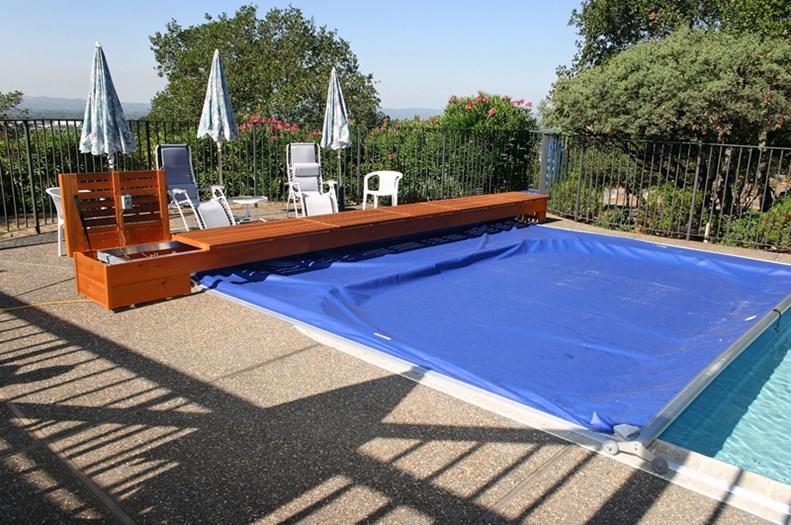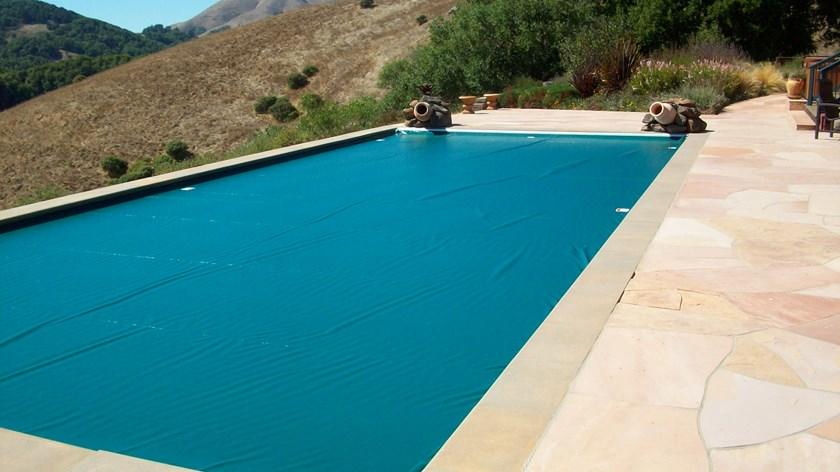
Pool covers are often considered luxurious accessories for homes with pools, but they are so much more. They are, in fact, essential accessories that provide significant benefits to the pool owners.
If you are a responsible pool owner, you should regard pool covers as an indispensable part of your swimming pool, and installing and maintaining them is obligatory.
In this article, you’ll find everything you need to know about swimming pool covers – the different types and benefits, and helpful suggestions for choosing the right cover for your pool.
What are the different types of pool covers?
There are several types of pool covers. When purchasing a pool cover you should consider your personal needs and budget before choosing a pool cover that’s right for you.
Look at the following types of pool covers and the pros and cons of each one.
1) Solar pool cover
Solar pool covers are often called giant bubble wraps because they resemble regular bubble wraps that protect fragile items. A solar pool cover is usually made from light, transparent plastic and floats on the surface of your pool. The air-filled bubbles absorb the heat from the sun, which then radiates that heat into the pool water, heating it. Solar pool covers can warm your pool by five to 15 degrees Fahrenheit.
As solar pool cover floats on the top of the pool, they are not anchored to the sides of the pool deck. However, they may be reeled in and out similarly to a leaf cover. Solar pool covers may also come in rings that don’t require reeling but are connected to each other by magnets.
Pros:
- It heats your pool water, making its temperature comfortable for swimming, especially during the evening or early morning.
- It helps to keep dirt and debris out of the water.
- It conserves water by reducing water and evaporation rates by up to 95%.
- It is more affordable than the other pool cover types.
- It is easier to set up, remove, and store than the other pool cover types.
Cons:
- The cover’s lightweight and loose fit provides no added safety features to prevent adults, children, and pets from falling into the water.
- A short lifespan (most solar pool covers last only up to three years).
2) Winter cover
Homeowners use traditional winter covers only seasonally. A winter cover consists of a basic tarp that protects your pool from the harsh effects of winter, usually frost. Winter covers are available in mesh and solid types and are usable for in-ground and above-ground swimming pools.
Pros:
- It protects your pool from debris and harsh winter conditions.
- It retains the chemicals in the pool water by preventing them from evaporating.
- It blocks the UV rays that promote algae growth in the pool.
- It is easy to install.
- It is generally more affordable than the other pool cover types.
Cons:
- While stronger than a solar cover, a winter cover is still not considered a safety device. It isn’t strong enough or equipped with enough security features to keep kids and animals from falling into the pool.
- It is less durable than the other types of pool covers. Tree branches, rain, and heavy snow can easily damage the tarp.
- It has a short lifespan (you will need to replace it every five years).
- The water weights or anchoring bags that anchor the cover require frequent replacement every other year.
3) Foam cover
A foam cover is typically made of a 100% closed-cell polyethylene mousse. Foam covers are available in various thicknesses. Their primary function is to retain the heat of the pool water, although they offer a handful of other benefits.
Pros:
- Excellent heat retention.
- Reduces evaporation, keeping the chemicals in the pool water.
- Durable, a foam cover is designed to withstand the impact of rising temperatures.
Cons:
- Foam covers are designed for indoor pools only, so they are not the best choice for outdoor pools compared to solar covers.
- Foam covers are not designed for safety as they cannot support the weight of children and animals.
4) Mesh cover
Mesh covers are one of the commonly used types of pool covers. A mesh cover performs the same function as a massive strainer in place of a solid tarp by letting rain and melted snow pass through it while keeping out larger particles (such as fallen leaves and branches). A mesh cover also allows a minimal amount of sunlight to penetrate.
Top-quality mesh covers are durable but lightweight, making them more manageable to install, remove, and store than solid tarp covers.
Pros:
- It does not require a cover pump since rain and snow pass through to the pool. This ability makes mesh covers the ideal option for areas that receive heavy rainfall or snowfall.
- It requires less maintenance.
- Pool owners in wet or snowy areas can save a lot of water yearly because mesh covers allow the water to pass through, gradually filling the pool.
- It does not pose a drowning risk.
- It is easier to maintain than a solid cover.
- It is durable.
- It is affordable.
- It is long-lasting (mesh covers typically last 10 to 15 years).
Cons:
- The cover’s mesh material allows sunlight, dirt, and sediment to enter the pool, which can encourage algae growth. The pool can become dirty, thus increasing your cleaning demands.
- Allows the sun’s UV rays into the pool, which means the water is at risk of evaporation and reduced chlorine levels. You may need to add more water to maintain the appropriate pool levels and more chemicals to balance your pool water.
- These covers are meant to be used during the winter months when you are shutting down your pool and won’t be needing to operate your pool cover. These covers are harder to put on and take off than other covers on the market.
5) Solid vinyl safety cover
If you own a backyard pool and have little children and pets in your family, pool security should be a top concern. Along with the other safety measures, such as a fence around the pool and pool alarms, install a solid vinyl safety cover to keep your loved ones safe from accidents.
Solid vinyl safety covers are the premium choice for residential swimming pools. High-quality vinyl safety covers, such as those made at Pool Covers, Inc. These are one of the only true safety covers on the market.
Pros:
- Safety pool covers keep children and pets out of the pool.
- It significantly saves water, chemicals, and energy needed to heat the pool.
- This type of pool cover maintains the cleanliness of your swimming pool by keeping dirt, debris, rainwater, and snow out, thus saving you cleaning time and effort.
- It prevents the water from evaporating.
- It keeps the sunlight out, thus preventing algae growth.
- It keeps the water’s heat in, making your pool ideal for swimming during the evening or early morning.
- It helps maintain the chemical balance in your pool.
- There are different types of mechanisms used with these covers to make them easier to use than some of the tarp types of covers.
Cons:
- Rainwater and melted snow accumulate on the cover’s surface. A puddle of water on top of the cover can still pose a drowning risk, especially to small children and pets. Thus, it requires a pool cover pump to remove standing water from the cover.
- A solid pool cover’s useful life is between 5-8 years, so it doesn’t last nearly as long as a mesh cover.
There are 3 types of safety solid vinyl safety covers:
- Manual –One of the advantages of manual pool covers is that they can fit pools of any shape, even the oddly shaped ones. This feature is something that an automatic cover cannot do. Manual vinyl safety covers use fasteners to secure them to the surrounding pool area and these covers are operated by hand. Also, they’re generally the more affordable cover option than automatic covers.
- Track Manual – Consists of low-profile tracks mounted to both sides of the swimming pool and operated by turning the hand crank. These are a manual style of safety cover but easier to use than the basic manual cover. These are also more affordable.
- Automatic – It is a retractable pool cover consisting of a track mounted on top of the pool or under the pool decking. The electric motor enables the cover to open and close by way of a key switch or pad. One of the best things about automatic covers is their convenience. These are the easiest covers to operate.
ASTM Standards
If you’re planning to get a safety pool cover, it’s essential to be aware of the safety standards that manufacturers of pool covers should adhere to.
We at Pool Covers, Inc. believe that safety is essential to every swimming pool. That’s why we want to ensure the safety of your pool with our covers that comply with ASTM standards. But what is ASTM, and why should all pool cover manufacturers comply with its standards?

The American Society for Testing and Materials, known as ASTM International, is a recognized organization that creates voluntary consensus standards for a wide range of consumer-oriented materials, goods, services, and systems. These standards ensure that manufacturers produce the best products, helping keep consumers safe from any injury.
As you might expect, the ASTM has also developed standards for safety pool covers. The standards for pool covers are labeled ASTM F1346-91. To meet the ASTM standards, pool cover manufacturers must meet the following four requirements:
- Weight – To enable rescue operations, the pool cover must have a minimum weight capacity of 485 lbs. This weight is roughly equal to two ordinary adults with one child.
- Perimeter Deflection Test – During this test, manufacturers must demonstrate that any opening on the pool cover is sufficiently small and robust enough to resist any efforts to pass through.
- Surface Drainage Test – By employing a semi-permeable material or a design element that allows the water to drain off the cover’s surface, this test demonstrates that the cover is constructed so that extra water (such as rainwater or melting snow) does not accumulate.
- Labeling – The pool cover must have the proper labels, such as manufacturer warranties and appropriate warnings.
Benefits of using a pool cover
Once again, pool covers are more than mere luxurious accessories. With so many benefits ranging from savings on energy to safety, pool covers are essential for anyone who owns a swimming pool.
If you haven’t installed a pool cover, here are the following reasons why you should:
- Safety – One of the essential benefits of having a safety pool cover is to reduce or eliminate accidents. A safety pool cover will prevent children and pets from falling into the pool if left unattended, provided that the cover is installed and operating correctly. When pool security is a top concern, go for the safety pool cover, especially if you have small children and pets in your family. Always consider the ASTM standards when looking for the right safety cover.
- Keeps out dirt and debris – To keep dirt and other debris from falling into the pool, coverings are typically installed. A pool cover blocks fallen leaves, twigs, branches, insects, and other debris, keeping the water sparkling clean, contamination-free, and ready for swimming. Covering your pool when it is not in use significantly saves your cleaning load.
- Eliminates Evaporation – When the pool is not in use and left open all day, it will lead to water loss due to evaporation. Your pool loses water at an even faster rate on a hot day. A pool cover can prevent water evaporation by up to 95%, an excellent way to conserve water, especially during the sweltering summer months.
- Reduces chlorine consumption — The sun’s ultraviolet (UV) rays can cut down your pool water’s chlorine levels by 35% to 60%. When chlorine evaporates, it can no longer protect your pool from harmful germs and bacteria. A pool cover filters out UV light, maintaining the proper chlorine levels in the water. With your pool covered, the water stays cleaner for longer, reduces the workload on your pool’s filter, and significantly saves on the cost of chemicals.
- Help maintain heat in the pool – Some pool covers help keep the water’s temperature up by 39 degrees Fahrenheit (4 degrees Celsius). Your pool stays warm throughout the day and even during the evening, which makes it a perfect spot for night or early morning swim. The use of covers to retain heat in the pool means your heating bills will not go through the roof, so to speak, reducing energy costs.

Choosing a pool cover
Choosing the right pool cover depends on an individual or family’s needs, and preferences. They can include the size and shape of the swimming pool, the climate in the area, whether a household has small children or pets, level of convenience, frequency of pool use, and budget.
1) Purpose
Begin your pool cover selection with a purpose:
- If you want to keep your children and pets safe from accidental drowning – Mesh or solid vinyl safety pool cover (manual or automatic)
- If you want to keep the temperature of your pool water – All pool covers can retain heat in the water, but solar and foam covers are the best options.
- If you are looking for extra convenience – Automatic pool cover (for easier closing and opening of the pool)
- If you live in a region where heavy rain or snow occurs – Mesh cover
- If you live in an area with severe winters – Winter cover
- If you’re conserving water – Almost all types of pool cover
- If you’re looking for an efficient cover but are also on a budget – a manual solid or mesh cover
- If you don’t use your pool quite often or if you’re going away on an extended holiday – A solid vinyl pool cover or mesh cover
2) The type of pool
You should also consider the type of swimming pool to choose the best cover.
If you own an above-ground pool, it requires winches to secure the pool cover. If you own an inground pool, it will need anchors for fastening the cover by the deck.
Whether you own an above-ground or inground pool, it’s best to consult your pool cover experts to help you find a cover with the perfect fit.
3) The pool’s shape, size, and other features
Determine the size and shape of your pool before selecting a cover. You need to know your pool’s size to avoid purchasing an ill-fitting cover and wasting money.
Also, consider the other features of your swimming pool (if any), such as fountains and waterfalls, when choosing a pool cover.
Manual or automatic covers can work for swimming pools of every size and shape, but manual covers are often the best choice for oddly shaped pools or pools with extra features.
4) Warranty
An extended warranty period is one of the indications of a quality pool cover. It means that the manufacturer is confident of the durability and reliability of their product.
Don’t settle for a cheap cover. Low-cost but inferior pool covers are the most likely to carry insufficient or zero warranty, which may cost you more money and trouble in the long run. Remember that the best pool covers always come with a price, but due to their quality and long warranty period, they will pay more than for the initial purchase and investment in a few years.
5) Budget
Budget is always a top concern in every home project, from repainting a kitchen to purchasing a cover for your backyard pool. Pool covers can range in price points from a few hundred to several thousand dollars. Depending on the type of pool cover, it also requires installation work, which can add up to the initial purchase cost.
So, figuring out how much you’re willing to spend on a pool cover before shopping around for one is crucial. Always remember to buy only a quality pool cover that your budget can afford but will also adequately serve your purpose.
Conclusion
If you own a swimming pool but haven’t installed a pool cover yet, you will appreciate how it can transform your pool backyard.
Pool covers come in many types and offer several benefits. If you install a safety pool cover for security reasons, remember that it isn’t a substitute for human supervision. However, a pool cover of good quality can add a layer of protection by acting as a barrier that can prevent accidental drowning.
By knowing the pros and cons of every type of pool cover and your own purpose and needs, you can make an informed decision that will enable you to purchase the best cover for your pool.
We hope that this “crash course” about pool covers has helped. But if you have other concerns we did not cover, don’t hesitate to contact us at Pool Covers, Inc. Call us at 707-864-6674 or message us at customerservice@poolcoversinc.com.
Pool Covers, Inc. has provided pool and spa cover advice, services, and sales to customers in Northern California for over 40 years. We’re always happy to help!











